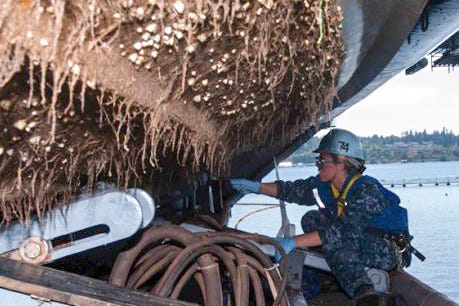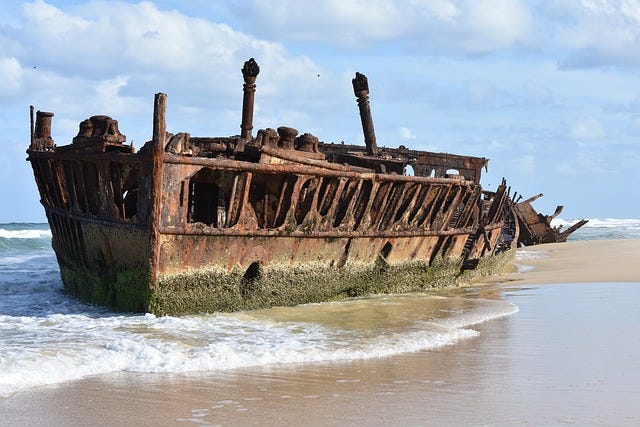I grew up in Minnesota, the land of 10,000 lakes. We had a cabin on a lake and a small boat that we could fish and water ski behind. My wife is from South Carolina. Her youth was spent boating on salt water rivers and the ocean. Apparently there is one significant difference in boat ownership between fresh water and salt water—barnacles.
Barnacles are small sea creatures that like to affix themselves to surfaces under the water. They naturally secrete a powerful cement that is one of the strongest glues known. The bottom hull of a boat is an ideal home for a barnacle. Barnacles can also attach themselves to piers or sea creatures such as whales or turtles.
Our ancestors discovered that putting copper plating on a wooden boat hull prevented barnacles from attaching themselves. As ships transitioned to steel or fiberglass hulls, however, other methods of barnacle prevention became necessary. My wife’s recollection of annual boat maintenance was cleaning the bottom and re-painting it every year. This process minimized the amount of barnacles that would attach to the hull during the season. Cleanup was also much easier if done on a regular basis because barnacles accumulate and secrete hard calcium plates that completely encase them, making them difficult to remove.
The presence of barnacles on a boat can cause a variety of problems. The increased weight on the boat will increase fuel consumption and increase drag under water, also reducing fuel efficiency and speed. According to one article, the U.S. Navy estimates that heavy barnacle growth on ships increases weight and drag by as much as 60 percent, resulting in as much as a 40 percent increase in fuel consumption!1 Barnacles can foul a propeller and make correct steering more difficult. In the long term, they can damage the hull and potentially make the ship unseaworthy. Extreme barnacle growth apparently affected the outcome of the 2018-2019 Golden Globe yacht race.
In the natural world, barnacles are not a joke. They grow slowly but can cause major problems if you do not stay on top of them. Regular maintenance and prevention are required to avoid a significant encrustation. A swimmer scraping up against barnacles can be severely injured or suffer from a bacterial infection from the scratches.
Barnacles are also a spiritual problem. Sin, wounds, bad habits and the desires of the flesh can accumulate like spiritual barnacles on our soul.
Picture your soul and spirit as a boat sailing on the seas of life. God created the human soul to navigate through life in clean waters, guided by the Holy Spirit and propelled by His gentle wind. Mankind has been damaged, however, by original sin. We do not live in the same state as Adam and Eve—we do not hear God as clearly. We also now have a tendency towards sin.
Mortal (deadly)2 sin—the kind of sin that separates us from God—is like a hole blown in the side of your ship. You are going to sink.
But there are sins which are not mortal (deadly). We call these venial sins. Even the just person falls.3 Venial sin may not blow a hole in the side of your ship, but it causes damage to your soul.
It is not only sin that wounds or damages our soul. We also bear emotional or psychological wounds from many things—our ancestors; our childhood; difficulties in life. If we do not pursue divine healing of these wounds, they can remain open and start to grow barnacles—barnacles of resentment, unforgiveness or anger, for example. When others scrape up against our woundedness, our reaction can injure them or even give them a spiritual infection if our spiritual barnacle deposit is serious enough.
We also have bad habits. Habits that are not by themselves sinful, but which tend towards the flesh rather than the spirit. St. Paul reminds us of this in the Letter to the Galations:
But I say, walk by the Spirit, and do not gratify the desires of the flesh. For the desires of the flesh are against the Spirit, and the desires of the Spirit are against the flesh; for these are opposed to each other, to prevent you from doing what you would.4
All of these things—sin, wounds, bad habits and the desires of the flesh—can accumulate like spiritual barnacles on our soul. We should stop and reflect on this analogy because it may actually help motivate us to do something about it. Just as with physical barnacles, spiritual barnacles can:
slow us down in the water spiritually (do you find it hard to do what God is asking you to do?);
cause us to exert more energy than necessary to reach our destination (do you feel spiritually tired? is it hard to pray?);
injure other people who rub up against us and encounter our woundedness (do you ever lash out at someone that irritated you or hurt your feelings?);
push us off course (we want to end up in Heaven); or
leave us dead in the water or even sink us.
If we are in a state of mortal sin (God forbid), we need to repent and confess our sins.5 We sometimes forget, however, that we must also repent from venial sins and strive not to commit them in the future. If we confess our sins, he is faithful and just, and will forgive our sins and cleanse us from all unrighteousness.6 Regular repentance and confession of sin will help free us from spiritual barnacles and keep us clean.
We also need to have a consistent and regular prayer life to keep our soul clean and free of spiritual barnacles. It is in our encounter with the living God, God our Father who loves us, that we are healed and made clean. We need to make reading the Word of God (the Bible) an important part of our prayer life. Jesus told us “you are already made clean by the word which I have spoken to you.”7 Psalm 51, for example, is a great prayer we can say for forgiveness and spiritual cleansing.8
Participation in a faith community is also important. Catholic Christians should attend Mass weekly and take advantage of the sacraments of confession and Holy Communion. Christians who do not belong to a sacramental church should attend regular services to listen to good preaching of the Word of God and Christian fellowship.
In addition to “regular maintenance,” we should take pro-active steps to protect ourselves from spiritual barnacles. The Bible teaches us about the “armor of God.”9 Perhaps one dimension of the protection of that armor is to prevent spiritual barnacles from attaching themselves to us in the first place?
Even a well maintained ship can start to pick up barnacles. Thus, sometimes we may discover that we have accumulated some spiritual barnacles. A more directed effort may be necessary to clean them off—remember, they are attached with the strongest glue! We might need to pray more intentionally about the issue—take out the spiritual pressure washer and focus the stream on the deposit. It could require the prayer ministry or intercession of another person. A spiritual retreat where we can dive deeper into prayer may be helpful.
Start by asking the Holy Spirit to show you where you have spiritual barnacles in your life. If you start to see a deposit, then ask the Holy Spirit, “How do I get rid of them?” Lord, teach us to pray.10 The Lord is faithful and He will lead you.
We read in the Gospel of St. Matthew that Jesus healed a leper. Leprosy as an advanced disease is terribly debilitating and disfiguring. If left untreated, it can cause permanent physical impairments and damage to a person's nerves, skin, eyes, and limbs. When you read this passage, think of this person being covered with spiritual barnacles instead. Imagine them pleading for Jesus to remove these stubborn, calcified growths from their spirit. Jesus can do the same for you.
When he came down from the mountain, great crowds followed him; and behold, a leper came to him and knelt before him, saying, “Lord, if you will, you can make me clean.” And he stretched out his hand and touched him, saying, “I will; be clean.” And immediately his leprosy was cleansed.11
My prayer for you today is that you would be free of all spiritual barnacles in the Name of Jesus! May the Lord send the Fire of the Holy Spirit to burn away every evil deposit in your life. May you have the courage and determination to examine yourself and take the steps necessary to clean off your soul from any spiritual barnacles. May you find smooth sailing and the peace of Christ in your journey.
There is a lot to ponder about spiritual barnacles. Please share your reflections in the comments.
What are barnacles? (National Ocean Service).
See Proverbs 24:16.
Galations 5:16-17, RSV-CE.
Catholics in the state of mortal sin must go to the sacrament of confession before receiving Holy Communion. If you find yourself in mortal sin and unable to get to confession immediately, you can pray an act of perfect contrition: Oh my God! I am heartily sorry for having offended Thee and I detest all my sins because I dread the loss of Heaven and the pains of Hell; But most of all because I have offended Thee, My God, Who art all-good and deserving of all my love. I firmly resolve, with the help of Thy grace, To confess my sins, to do penance, And to amend my life. Amen.
1 John 1:9, RSV-CE.
Matthew 8:1-3, RSV-CE.






